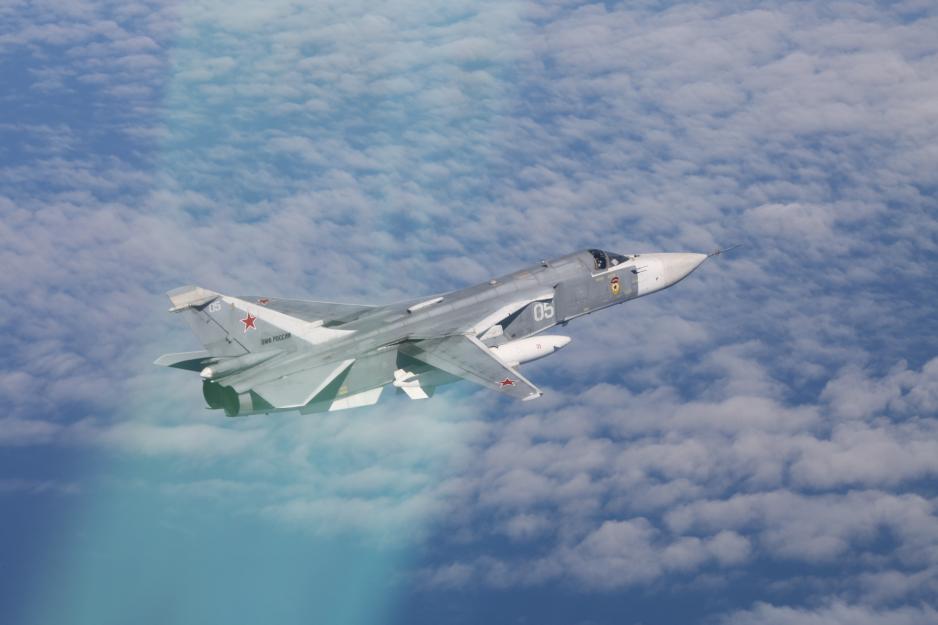Russia’s Violations of Norwegian and Allied Airspace: “Sign of Desperation,” Says Professor

In April, a Russian Su-24 aircraft flew through Norwegian airspace over the ocean areas off Vardø, Northern Norway. The border violation lasted for four minutes and was the first of a total of three so far this year. The photo of the aircraft was taken at a different occasion. (Photo: the Norwegian Armed Forces)
Russia has violated Norway's airspace in the North three times this year, as well as the airspace of several other NATO countries. This suggests that the war in Ukraine is going much worse than Moscow wants to admit, says Professor Tormod Heier at the Norwegian Defense University College.
Last week, NATO condemned the Russian violation of Estonia's airspace on September 19th, while also referring to Russian airspace violations in Poland, Romania, Finland, Latvia, Lithuania, and Norway.
In 2025, Russia violated Norwegian airspace above and off Finnmark on three occasions, according to Norway's government. This happened after ten years with no such incidents.
"The airspace violations lasted between one to four minutes. We have not been able to ascertain whether these airspace violations were intentional or the result of navigational error. Regardless of the reason, this is not acceptable, and we have made this clear to Russian authorities,’ says the Norwegian Prime Minister Jonas Gahr Støre (Labor).
Støre underlines that Russia's violations of allied airspace are irresponsible and occur in an already serious security situation.
Shows desperation

Tormod Heier, Professor of Military Strategy and Operations at the Norwegian Defense University College. (Photo: FHS)
"I interpret these violations as a sign of Russian frustration, desperation, and discouragement," says Tormod Heier, Professor of military strategy and Operations at the Norwegian Defense University College, to High North News.
"After three and a half years of war in Ukraine, the Russians have only won 120,000 km2 of terrain. This nearly equals the total area of Finnmark, Troms, and Nordland [the three counties in Northern Norway, ed. note]," he points out and continues;
"The overflights in allied airspace are thus, as I see it, a sign that the war in Ukraine is going much worse than Moscow wants to admit. If there is to be progress in what has become Russia's biggest security problem, Europe's economic and military support for Ukraine must be stopped. And that would require the Kremlin leadership to be much tougher."
The airspace violations in the North
· April 25th: A Russian Su-24 fighter flew through Norwegian airspace above the ocean areas northeast of Vardø, Northern Norway, for four minutes.
· July 24th: A Russian L-410 Turbolet transport aircraft flew through Norwegian airspace above an uninhabited area along the land border in Eastern Finnmark for three minutes.
· August 18th: A Russian Su-33 fighter flew through Norwegian airspace over the ocean areas northeast of Vardø for one minute.
Has the opposite effect
At the same time, Russia's room for action is decreasing as it is drained of economic, military, and human resources, notes Heier.
"Russia also knows that it is inferior to the West. Measured in economic, military, and diplomatic power, Russia is a mosquito compared with the USA and NATO. However, the Russians have two advantages: They possess many more nuclear weapons than the West. And they know that they are far tougher than the USA and the West when it comes to scaring the decision-makers in the opposite camp, through measures such as sabotage operations or with drones, fighter jets, and nuclear weapons."
Yet, this strategy is not working as Moscow would want.
"The more the Russians scare, the stronger the inner unity of most NATO countries," the professor points out and continues:
"Therefore, there is something irrational and 'Russian' over Putin's approach: Russia believes it will win by demanding respect and force Western obedience. But the reality is the exact opposite. Despite increasing Russian escalation along the NATO border, the support for Ukraine only increases because more and more people, also within the Trump Administration, is starting to understand that peace will only come when Putin is forced to it."
Anything could happen.
Expects increased hybrid warfare
Furthermore, there is reason to assume that irritation over Putin and uncertainty are brewing on the Russian side, believes Heier.
"Putin had Trump 'in his pocket' this spring and summer. But he may have wasted a golden opportunity to throw a spanner in the works of the transatlantic security community, because now Trump appears to be more convinced that the Europeans and Ukrainians are right, not Putin," he states and continues:
"This increases uncertainty within the Russian power vertical, particularly among a number of actors in the security services and the military forces, as well as among the oligarchs. The 'best' they can do is to stand together and increase the pressure through further escalation of the hybrid warfare against the West, until it can't go any further."
"And what happens then? No one knows. That is exactly why we fear Russia. Because anything could happen. But more often than not, it hurts the Russians more than it hurts the West," notes the professor.
If Russia has intentionally violated the airspace of multiple countries, then this is a very serious situation.
The government's response
In response to Russian airspace violations in the North, the Norwegian government has requested an explanation from Russia, while keeping the Norwegian parliament and NATO informed.
"Norwegian authorities have dealt with these incidents directly vis-à-vis Russian authorities with the aim of reducing the risk of misunderstandings and escalation," says the Norwegian Minister of Foreign Affairs, Espen Barth Eide (Labor).
"Even if these incidents were due to navigational error, as a result of Russia operating with too small a margin of error, Russia has a responsibility to act in a way that prevents misunderstandings and mistakes. If Russia has intentionally violated the airspace of multiple countries, then this is a very serious situation indeed," he underlines.
Russian response
On its side, Russia maintains that there have been no Russian violations of Norwegian airspace.
"We can confirm that the Norwegian Ministry of Foreign Affairs has informed us about the incidents in question, which we have taken very seriously. However, the information from the Norwegian side has not been confirmed by objective Russian surveillance data," writes the Russian Embassy in Norway on X.
The embassy also criticizes NATO and Norway.
"For our part, we would like to emphasize that the provocative course that NATO has chosen to follow in intensifying the military activities of its member states in the High North, including military exercises in which our country is designated as a hypothetical enemy, only increases tension and entails the risk of a further escalation of the military situation in the region. The responsibility for this lies directly with the NATO countries, including Norway, which is one of the leaders of the alliance's policy in the Arctic."




